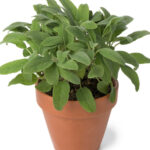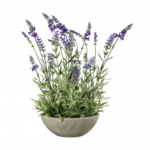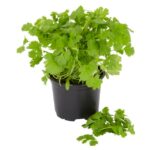Many of our everyday herbs are used as fragrances in our cosmetics or for flavouring our food and drinks. However, these herbs are also medicinal plants with an array of healing properties, and have been cultivated for centuries as herbal remedies due to their effectiveness in treating many different ailments. Medicinal herbs can be seen as a gift from nature, with their natural ability to prevent possible diseases by treating the body in a holistic way and strengthening the body’s own healing power. They are accessible, easy to take care of and can be grown at home, providing you with your own first aid kit.
As medicinal plants have potent properties, they can trigger side effects and interact with other herbs or supplements, and should therefore be used on a short-term basis, with care and with guidance when necessary. Although herbal medicine is a natural source of healing, it is important to always inform your health care provider when using medicinal plants as they may conflict with various prescribed medication, or may have adverse effects in the case of pregnancy or illness.
 Sage: Often cultivated for culinary purposes, Sage has been well known for centuries for its many medicinal uses and healthful properties. It has antiseptic and antibacterial properties, and can be used as a gargle to treat sore throats, dental abscesses, infected gums and mouth ulcers. It contains strong antioxidants and is known for fighting inflammation, sometimes used as a steam inhaler for asthma. It is used to relieve painful menstruation symptoms, with research showing that it improves menopause symptoms, particularly hot flashes, as it is believed to rebalance the sweat-regulating mechanism in the brain that can be thrown out of balance by hormonal changes taking place during menopause. It has been noted for strengthening the nervous system, helping to ease depression and is used to help digest fatty foods. Sage tea has been called “thinkers tea” as it has shown to improve memory and increase alertness and attention.
Sage: Often cultivated for culinary purposes, Sage has been well known for centuries for its many medicinal uses and healthful properties. It has antiseptic and antibacterial properties, and can be used as a gargle to treat sore throats, dental abscesses, infected gums and mouth ulcers. It contains strong antioxidants and is known for fighting inflammation, sometimes used as a steam inhaler for asthma. It is used to relieve painful menstruation symptoms, with research showing that it improves menopause symptoms, particularly hot flashes, as it is believed to rebalance the sweat-regulating mechanism in the brain that can be thrown out of balance by hormonal changes taking place during menopause. It has been noted for strengthening the nervous system, helping to ease depression and is used to help digest fatty foods. Sage tea has been called “thinkers tea” as it has shown to improve memory and increase alertness and attention.
 Lavender: Grown in gardens for its beauty and natural scent, Lavender is an herb with many uses, popular as a fragrant ingredient in soaps, perfumes, potpourri and decorations. Lavender has a long history of use in natural remedies and has been proven effective for many different kinds of ailments. It is known for its antibacterial, antimicrobial, expectorant, stress-relieving, antiseptic and analgesic properties. Lavender has been used as a sedative to relieve stress and tension, to treat headaches in menopause, and for relieving anxiety and depression. It can help to alleviate respiratory disorders, relieve body pain and to treat various skin problems, and when orally ingested or inhaled, Lavender essential oil was found to protect the stomach against gastric ulcers. Lavender tea is used to improve digestion and can help with gastrointestinal problems. Dried homemade lavender sachets can be used to help with insomnia, and strong lavender tea is said to be helpful in treating dandruff and lice.
Lavender: Grown in gardens for its beauty and natural scent, Lavender is an herb with many uses, popular as a fragrant ingredient in soaps, perfumes, potpourri and decorations. Lavender has a long history of use in natural remedies and has been proven effective for many different kinds of ailments. It is known for its antibacterial, antimicrobial, expectorant, stress-relieving, antiseptic and analgesic properties. Lavender has been used as a sedative to relieve stress and tension, to treat headaches in menopause, and for relieving anxiety and depression. It can help to alleviate respiratory disorders, relieve body pain and to treat various skin problems, and when orally ingested or inhaled, Lavender essential oil was found to protect the stomach against gastric ulcers. Lavender tea is used to improve digestion and can help with gastrointestinal problems. Dried homemade lavender sachets can be used to help with insomnia, and strong lavender tea is said to be helpful in treating dandruff and lice.
 Rosemary: This herb is a widely used culinary spice and is also used as a fragrance in soaps and cosmetics. One of the oldest known medicinal herbs, Rosemary is recognised for providing numerous health benefits and has been used in traditional medicine for increasing alertness and immunity, and improving mental function and memory. The oil contains antibacterial, antifungal and antiviral properties and is used to treat headaches as well as relieve muscle pain, rheumatism and arthritis. Research shows that it can be used to help fight cancer. Rosemary is also a known antimicrobial agent, with the powdered leaves used as an effective flea and tick repellent. It is used for improving digestion by helping with problems such as flatulence, heartburn and loss of appetite, and can help with IBS due to its antispasmodic properties. Rosemary should not be taken in large amounts and used only in cooking if pregnant, as it could cause a miscarriage.
Rosemary: This herb is a widely used culinary spice and is also used as a fragrance in soaps and cosmetics. One of the oldest known medicinal herbs, Rosemary is recognised for providing numerous health benefits and has been used in traditional medicine for increasing alertness and immunity, and improving mental function and memory. The oil contains antibacterial, antifungal and antiviral properties and is used to treat headaches as well as relieve muscle pain, rheumatism and arthritis. Research shows that it can be used to help fight cancer. Rosemary is also a known antimicrobial agent, with the powdered leaves used as an effective flea and tick repellent. It is used for improving digestion by helping with problems such as flatulence, heartburn and loss of appetite, and can help with IBS due to its antispasmodic properties. Rosemary should not be taken in large amounts and used only in cooking if pregnant, as it could cause a miscarriage.
 Coriander: Otherwise known as Cilantro, Coriander is another ancient and popular herb that is used in cooking around the world. Like other herbs, it has wonderful healing properties and carries many important plant-derived chemical compounds that are known to have disease preventing and health promoting properties. Coriander is one of the richest herbal sources for vitamin K and is a good source of minerals like potassium, calcium, manganese, iron and magnesium. It contains antiseptic, antifungal, antioxidant, disinfectant and antibacterial properties, and has been shown to reduce blood pressure and blood sugar. Coriander tea has been used to relieve gas, heartburn, nausea, bloating, and upset stomachs, and aids in efficient digestion. It has been shown to accelerate the removal of heavy metals from the body and to protect the body from infection and toxins. Due to its phenolic acids and polyphenols, it helps with joint pain and as a natural stimulant, it regulates proper secretion from the endocrine glands, helping to regulate menstrual cycles and reduce menstrual pain. Used both internally and externally, Coriander soothes skin irritation, including hives, sunburn and poison ivy.
Coriander: Otherwise known as Cilantro, Coriander is another ancient and popular herb that is used in cooking around the world. Like other herbs, it has wonderful healing properties and carries many important plant-derived chemical compounds that are known to have disease preventing and health promoting properties. Coriander is one of the richest herbal sources for vitamin K and is a good source of minerals like potassium, calcium, manganese, iron and magnesium. It contains antiseptic, antifungal, antioxidant, disinfectant and antibacterial properties, and has been shown to reduce blood pressure and blood sugar. Coriander tea has been used to relieve gas, heartburn, nausea, bloating, and upset stomachs, and aids in efficient digestion. It has been shown to accelerate the removal of heavy metals from the body and to protect the body from infection and toxins. Due to its phenolic acids and polyphenols, it helps with joint pain and as a natural stimulant, it regulates proper secretion from the endocrine glands, helping to regulate menstrual cycles and reduce menstrual pain. Used both internally and externally, Coriander soothes skin irritation, including hives, sunburn and poison ivy.
Oregano: Meaning “delight of the mountains” in Greek, Oregano is particularly used in Greek and Italian cuisine and is recognised for its nutritional, anti-oxidant and disease preventing properties. It is an excellent source of vitamins A, C, E and K, containing folate, magnesium, calcium, iron, manganese and niacin. Oregano is used for gastrointestinal disorders such as diarrhoea, gas, heartburn and bloating, and can help the body to detox and reduce fever. The essential oils from the leaves contain carvacrol and thymol, which have antibacterial and anti-fungal properties, helping with foot or nail fungus, earaches, sinus infections and colds. Oregano oil is also used for respiratory tract disorders such as coughs, asthma, croup and bronchitis, and also for internal parasites and as an insect repellent. Oregano is also known for relieving pain, and the tea is said to be very effective for menstrual cramps, in addition to helping with insomnia, anxiety and headaches. An oregano poultice can be used to sooth sore muscles and for eczema.
 Dill: One of the ancient herbs of the Bible, Dill has a long history as a culinary spice and is used in a wide array of dishes. In addition to its culinary uses, Dill is another medicinal herb containing many plant-derived chemical compounds that are known to have anti-oxidant, disease preventing and health promoting properties. It contains a significant amount of calcium, vitamins A and C, and trace amounts of folate, iron and manganese. Dill oil contains anti-spasmodic, carminative and digestive properties, and is used for digestive problems such as colic, flatulence and loss of appetite. It is also said to have a calming effect on the nerves, is helpful for anxiety and used to prevent insomnia. Dill is used for urinary tract disorders, including kidney disease and painful or difficult urination, and is said to maintain regular menstrual cycles. Known for its anti-inflammatory properties, Dill can help to reduce inflammation and associated pain from rheumatoid arthritis, gout and arthritis. Dill tea improves the digestive process, helps with hiccups, can help lower blood sugar, and applied topically, can help to disinfect wounds and treat and heal boils.
Dill: One of the ancient herbs of the Bible, Dill has a long history as a culinary spice and is used in a wide array of dishes. In addition to its culinary uses, Dill is another medicinal herb containing many plant-derived chemical compounds that are known to have anti-oxidant, disease preventing and health promoting properties. It contains a significant amount of calcium, vitamins A and C, and trace amounts of folate, iron and manganese. Dill oil contains anti-spasmodic, carminative and digestive properties, and is used for digestive problems such as colic, flatulence and loss of appetite. It is also said to have a calming effect on the nerves, is helpful for anxiety and used to prevent insomnia. Dill is used for urinary tract disorders, including kidney disease and painful or difficult urination, and is said to maintain regular menstrual cycles. Known for its anti-inflammatory properties, Dill can help to reduce inflammation and associated pain from rheumatoid arthritis, gout and arthritis. Dill tea improves the digestive process, helps with hiccups, can help lower blood sugar, and applied topically, can help to disinfect wounds and treat and heal boils.
Tina Sayer, Contributing Editor
Tina is a Wellness and Parenting coach, writer and poet. Apart from her coaching, she delivers motivational speeches and workshops on Wellness and Parenting. She is passionate about healthy living and caring for our animals and planet. Much of her spare time is spent in nature with her dogs, and as a mother and nurturer. Tina has been a loyal volunteer with MCC (formerly Bloom in Wellness) for many years and is now a contributing editor.
